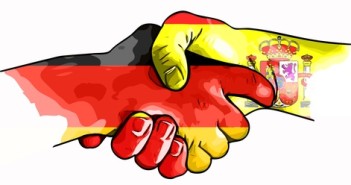After Spain “went Irish” by taking over Bankia, and Catalonia asked for help, the road to asking for external help became a slippery slope. There are reports that the German leadership already pressured Spain to accept a bailout program, and that Madrid refused.
But now, a bailout program is becoming reality as Spain is running out of money. Here are 4 possible solutions and why Germany has clear interests to get it right this time:
- Classic Bailout: Following the footsteps of Greece, Ireland and Portugal, Spain could get aid from the IMF and the European temporary bailout fund, EFSF. The money would be used by the banks, like in Ireland and more austerity would be enforced on the Spanish people. Spain is seen as “too big to bail” due to its big size. It’s hard to see where the money would come from. So the size of the bailout would probably be limited, and the program would probably fall short.
- ESM Bailout :The “permanent” bailout fund could be used for the first time on Europe’s fourth largest economy. There are talks that it will be ready in July. This could be a bigger bailout, yet the ESM hasn’t been ratified yet. So, also this has limited scope.
- European wide bank guarantee: As the problem is mostly with the banks, providing defense to deposits could stop the capital flight. The chances seem low.
- ECB action via the SMP: The ECB bought Spanish bonds in the past and managed to stabilize yields. After the launch of the LTRO, the ECB limited the program until it came to a full stop. Buying more bonds would cause a “moral hazard” – no incentive for Spain to make reforms. In the current situation, having Spain shut out of markets could be an even harsher moral hazard. When push comes to shove, the German objection to such a move could be lifted and the ECB could use its unlimited firepower to lower the yields. If the move is strong enough, other market participants would join and the yields would fall even further, even stopping the capital flight. This is the fastest solution and it also avoids an official bailout.
German interests
It’s very important to remember that Germany has a lot of interest to stabilize Spain and not see it fail and exit the euro-zone.
- Private sector exposure: German institutions are exposed to Spain, which is much bigger than Greece. A failure of Spain could cause significant damage to German banks.
- ECB exposure: the central bank is exposed to Spain through Target2 imbalances, ELA lending and it also holds some Spanish bonds.
- Euro without Spain?: It’s hard to imagine the existence of the euro without the fourth largest economy. An exit of Spain (sometimes called Spexit) would trigger a much stronger domino effect than a Greek exit. And Germany needs the euro.
Germany prospered since the middle of the 2000s and also after the crisis erupted. If Germany would have used the Deutsch Mark, it would have been much higher than the value of the euro. This gave a huge boost to Germany’s exports. It didn’t enjoy the large trade surplus that it enjoys now.
This article is part of the Forex Monthly Outlook for May. You can download it by joining the newsletter in the form below, which appears on any article on Forex Crunch.
